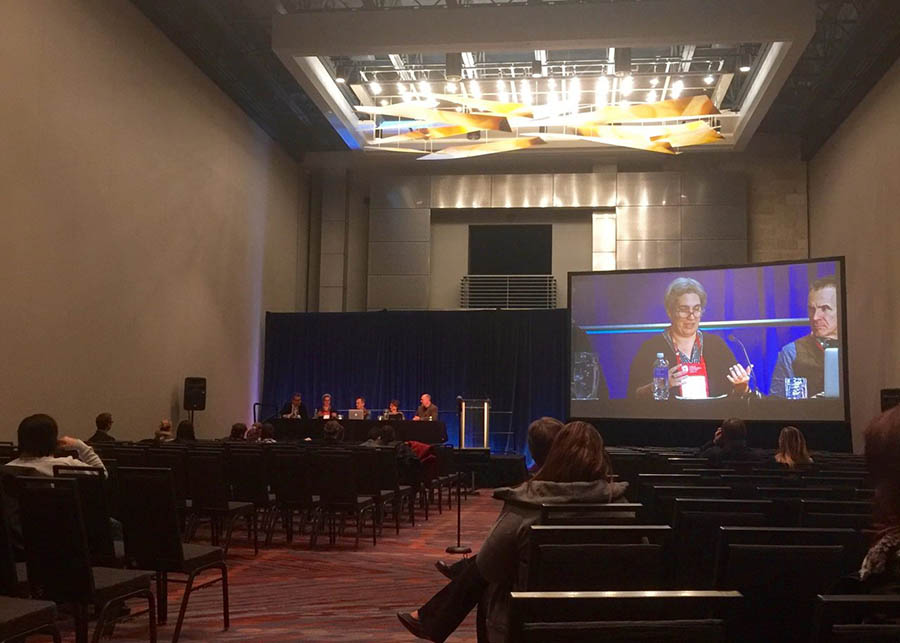This is an exciting time for CASTAC and the CASTAC Blog. CASTAC hosted a number of well-attended events at November’s Annual Meeting of the American Anthropological Association in Denver, including our business meeting, while our website sports a great redesign from returning Web Producer Angela VandenBroek. To ring in the new year here at the CASTAC Blog, I’m continuing our yearly tradition of introducing the new team. When Patricia Lange, Jenny Cool, and I launched the Blog in 2012, we envisioned a collaborative space for discussing emerging work on science, technology, and computing from anthropological and ethnographic perspectives. To quote our About page, our goal was to “to build a thriving discourse among a community of scholars concerned about the implications of techno-science, technologized products, and worldviews for human beings and other forms of life.” We began with a team of two, Patricia and me (plus many generous authors) publishing weekly posts. This took enormous effort on the Editor’s part, which was not sustainable for an all-volunteer operation. So in 2014, Patricia announced our first crackerjack team of Associate Editors who brought in myriad perspectives, their own and those of guest authors. This collective model helps the blog keep pace with boundary-pushing research in anthropology, STS, informatics, and related fields, from graduate students and senior researchers alike, and has modeled how a scholarly blog can link academic conversations to broader public debates.

CASTAC’s Patricia Lange at the First Annual AAA Virtual Conference in Denver, November 2015. Photo by Taylor R. Genovese, used with permission.
As I begin my second year as the Blog’s Editor, I’m pleased to say we are expanding our editorial team (redubbed Contributing Editors to reflect better their role). We are losing one longtime editor, the intrepid Beth Reddy, stepping down in anticipation of her new role as CASTAC Co-Chair in 2017—thanks, Beth, and congrats! Meanwhile, seasoned editors Todd Hanson, Shreeharsh Kelkar, Ian Lowrie, Lisa Messeri, and Casey O’Donnell are all continuing, along with last year’s new recruits Elizabeth Rodwell, Adam Webb-Orenstein, Emily Wanderer, and Jamie Sherman. Glad to have you all! We’re sad to say good-bye to our Outreach Manager Michael Scroggins, however, who kept the Twitter feed and Facebook page lively this past year. Finally, we are welcoming five new Contributing Editors, many who are longtime Blog and/or CASTAC participants, and who expand the blog’s breadth with an exciting range of interests: Emily Brooks, Elizabeth Hare, Yuliya Grinberg, Sean Mallin, and Jasmine McNealy. Read on to find out more about them.
Don’t forget that we are always seeking new posts and contributors, especially short essays on new research and ideas and anthropological perspectives on current topics and events related to science, tech, information, data, and so forth. If you’d like to write for the Blog, contact one of the Contributing Editors with an idea for a post, or email me directly (jkraemer@wesleyan.edu). Please join me in welcoming the new team and the new year!
Jordan Kraemer
Editor, The CASTAC Blog
Brooklyn, January 2016
The CASTAC Blog 2016
Incoming Contributing Editors
Emily Brooks
Ph.D. Candidate, Anthropology, University of California, Irvine
ebrooks1@uci.edu
The science and cultural politics of environmental problems like drought, desertification, and climate change in the Western United States.
Topics: environmental anthropology, drought, energy, water politics, climate change
Lizzy Hare
Ph.D. Candidate, UC Santa Cruz
emhare@ucsc.edu
Computational and conceptual models scientists and activists use to develop long-term environmental histories that inform conservation strategies.
Environmental anthropology, conservation, lab practice, intersections of STS and environmental anthro
Yuliya Grinberg
Ph.D. Candidate, Anthropology, Columbia University
yg2229@columbia.edu
Digital technology and digital data in relation to a range of theoretical debates in anthropology and philosophy; digital self-tracking enabled by a growing range of web and mobile applications and sensor technology, especially in relation to selfhood and the body.
Digital technology, personal data, quantified self, self-tracking, wearables, data and the body, aesthetics of data
Sean Mallin
Ph.D. Candidate, Anthropology, UC Irvine.
smallin@uci.edu
Law, economy, urban planning and design, bureaucracy and expertise, and political ecology
Jasmine McNealy
Assistant Professor, Department of Telecommunication, University of Florida.
jmcnealy@jou.ufl.edu
Information, communication and technology with a view toward influencing law and policy.
Information & communication technologies (ICTs), privacy, social media, information and data in society
